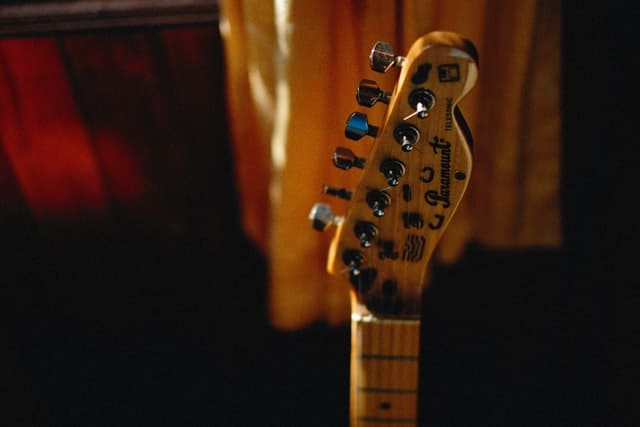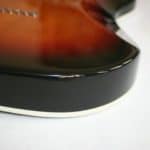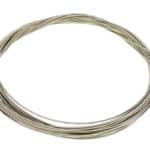Strings are one of the most important parts of a guitar.
Without them, it is impossible to play our instrument… literally!
You may lack a pick, a cable, or even the amp, but if you don’t have strings, you cannot play at all.
Thus, guitarists pay attention to these precious objects: they change them regularly, they clean them, and whenever it is possible they purchase only the best of the best.
There is another aspect that guitarists consider, and that is the string gauge.
The gauge conditions the tone and the “feel” of the playing. For instance, heavier gauges sound heavier and more solid than lighter ones.
Unfortunately, despite wanting to change to a heavier gauge, some guitarists back down from that decision. The reason is, that they believe it will damage the guitar.
But how real is that statement?
Heavy gauge slightly damages guitar parts, such as the nut, the bridge, and the neck. However, these damages are not irreversible and apply on rare occasions. All in all, it is more probable to break the strings due to extra tension.
Now, the question is, which are those “rare occasions” where the guitar gets damaged? Plus, how can you solve it, in case it occurs?
You’ll find all the answers below!
What’s the point of using thicker than standard guitar strings?
Thicker strings present a good deal of reasons to be used, especially because some of them are considered advantages among many guitarists.
First of all, they provide a different tone. It is often characterized as fatter, louder, and overall, heavier than the one produced with thinner strings.
As a result, heavy metal players may generally prefer heavy gauge strings over their counterparts.
Second, these types of strings help maintain the same tension when playing with lower tunings (Drop D, C# Standard, etc.). This occurs because thick strings have much more volume.
If, on the contrary, you decide to use light gauge strings, they will feel floppy whenever you tune down. In the end, this will affect both playing and sound.
This characteristic makes these strings, again, a favorite among metal players.
Lastly, heavy gauge strings provide more tuning stability. In other words, they stay in tune for longer periods of time, compared to standard strings. This is the result of an increase in tension.
Can thicker strings damage your guitar’s neck?
Fortunately, this situation is not likely to occur.
On the contrary, you actually run the risk of breaking your strings when applying too much tension. The guitar’s neck will be fine.
Truth is, the neck of a guitar is rather strong, and will endure tension with little to no problem.
However, in case the tension is extremely tense, it might occur that the neck raises. Worst case scenario, the action raises as well, which makes it slightly harder to fret the strings.
The solution is to adjust the truss rod by tightening its screw. This way, you are putting the neck back in its place.
Although you should consider leaving this task to a professional so as to avoid permanent damages to the instrument.
Can thicker strings damage your guitar’s nut?
Sometimes, the string gauge is too heavy to fit in the nut.
As a result, the slots in the nut need to be changed. For example, you may need to file them so the strings fit in.
However, this is the least of the problems. After all, you are not damaging the nut, just adapting it to a different set of strings.
This means that if the job is done properly, you cannot ruin the instrument.
On the contrary, a remarkable change in gauge could indeed break the nut. This is most likely the case with older, more fragile nuts.
Naturally, the best solution would be to replace the nut. Find one in which the slots are deep and wide enough to match the string gauge.
Can thicker strings damage your guitar’s bridge?
The bridge of a guitar won’t break. Nonetheless, higher tensions could pull it up away from its initial position.
In other words, a part of the bridge may lift or “move” due to the extra tension.
But again, this is not a regular issue because it applies to certain types of bridges, like the tremolo bridge.
The way of solving this issue is, once again, with the help of a screwdriver.
Go to the back cavity of the instrument, then tighten the screws that control the tension of the springs. As a result, the springs will pull the bridge back down.
Can thicker strings damage your guitar in any way?
The guitar strings damage the instrument one way or another. However, there are some things to consider regarding this fact:
- Every “damage” has a solution – whether it is a lifted bridge or tilted neck.
- Damages occur in replaceable parts – The nut, for instance.
- The higher risk is breaking the strings due to extreme tension.
We could argue that strings wear the fingerboard out, but of course, this is as natural as breaking a string because the string was old and rusted.
The fretboard is bound to be worn out no matter what.
Should you prepare your guitar in any way for thicker strings?
If you want, you can consider these set ups tips before changing to a heavier gauge.
As we said, there will be no drastic damages if you decide not to configure the guitar.
But, all things considered, here are the tips.
First, replace the nut. Find one with bigger slots, so the strings fit in properly.
Then, tighten the springs to avoid pulling out the bridge. Do this only for tremolo bridges.
In some cases, you may want to adjust the truss rod and lower the action. The changes must be minimum, so don’t go too far.
Lastly, remember to tune from low to high. More specifically, go as low as you can, then tune up until you find the tuning you need.
This is to ensure the tuning is stable.
That’s it! Now take your guitar and enjoy the music!

Hello there, my name is Ramiro and I’ve been playing guitar for almost 20 years. I’m obsessed with everything gear-related and I thought it might be worth sharing it. From guitars, pedals, amps, and synths to studio gear and production tips, I hope you find what I post here useful, and I’ll try my best to keep it entertaining also.





